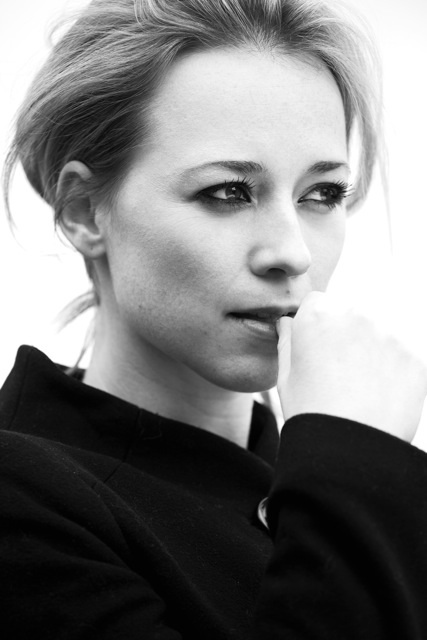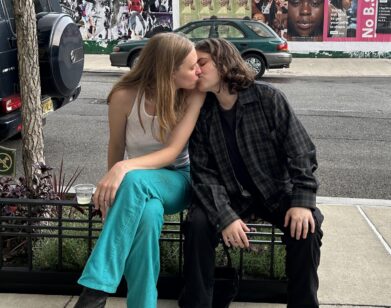Karine Vanasse Stays Grounded

ABOVE: KARINE VANASSE. PHOTO COURTESY OF MAXYME G. DELISLE
Karine Vanasse has taken the role of Colette, a supporting character in the ABC ensemble drama Pan Am, and turned it into something altogether her own: a wholly nuanced and charming performance that works just as well on its own as it does in the series. It’s this kind of genuine presence that has made it difficult to ignore Vanasse—she’s a huge star in her native Canada and has, before the age of 28, worked with Woody Allen. Plus, she’s a real delight to talk to. We were lucky enough to talk to Vanasse during a break from filming in Los Angeles.
KARINE VANASSE: I’m in West Hollywood right now . . . very centrally located. Where are you?
NED HEPBURN: I’m in Brooklyn. You guys shoot here, didn’t you?
VANASSE: Yeah! We shot at Steiner [Studios, in Fort Greene]. I’ve been very lucky to have the chance to shoot in New York—when we shoot in New York, well, I’m from Montreal, so I get to be close to home. Shooting in New York gives us such a great energy. It would have been completely different if we had shot on a soundstage in, say, Los Angeles.
HEPBURN: That’s one of the things I really like about the show. You can tell a lot of it is not shot on a sound stage.
VANASSE: Yeah! Obviously the plane is on a stage but besides that? Yeah, the locations make the show richer.
HEPBURN: So, I’ll cut to the chase. I saw you on the show and found you interesting but in the time it took from pitching this interview to actually conducting it I found that you are massive in Canada.
VANASSE: I started working in Québec, the French side of Canada. Only really in the last year or so have I started working more heavily in the English side of Canada, but I’ve been working [in Québec] as an actress since I was 10. My first real lead was when I was 13.
HEPBURN: Can you tell me about that?
VANASSE: It was a coming-of-age story! It was also my first real audition outside of extra work and commercial stuff, you know? It allowed me to continue doing movies at an early age rather than keep doing TV—not that TV is bad!—but at an early age, I was lucky to make the transition. It was a good school.
HEPBURN: What did you do after that?
VANASSE: From the ages of about 19-21, I worked as an actress and also a producer on a movie called Polytechnique [about the 1989 massacre at Montreal’s École Polytechnique, in which a lone, misogynistic gunman killed several female students]. So I was very lucky to do that. The transition from child actress to more mature actress can be a difficult patch, and the fact that I focused on that project… it was something I really wanted to do, to see adapted onscreen. As an actor you arrive most of the time at the last minute. You arrive at the end of the process, but you don’t realize it. You’re the one promoting it, but you were only there for the shooting part which is the…
HEPBURN: The very last part.
VANASSE: Right. It’s the force of what it is. You’re conscious of it, yes, but not that much. Polytechnique taught me everything else that goes on [around the production]. It’s a perspective thing. You learn you’re a small part in the big picture. When I have to promote things now, sometimes I realize that I had a movie in mind, but in the end, it’s a vision of somebody else so I have to promote their idea. So I learned a lot from that experience. It was so meaningful for me to do a movie based on that event. You know when have the feeling that you did something really good that you can’t go below that, after that?
HEPBURN: Frequently.
VANASSE: Ha!
HEPBURN: Sorry, go on.
VANASSE: That’s what it was like after working on Polytechnique.
HEPBURN: Is there a huge difference between French Canada and Canada-Canada? Culturally, anyway?
VANASSE: Yeah, yeah. It’s sometimes easier for the French Canadian side because we don’t have to compete with the American industry. As for the Canadians—good actors and good directors are sometimes taken by the American market, you know, if they’re good enough. So I think it was easier for the French-Canadian side to develop its own little star system, because obviously we receive movies from France, but the accent is different. So early on, we had a chance to develop our own film industry, TV industry, and there’s only about seven million people in that part of Canada. So it’s not that big. But for the amount of movies that we produce every year, and the fact that they’re funded in part by the Canadian government makes a big difference. I was really excited to be able to cross the border and go to America, but I was equally as excited to first audition in Toronto. It’s a completely different market.
HEPBURN: I have to bring this up. You did the voiceover of Wendy on the French-Canadian version of South Park? That sounds like the best job in the entire world.
VANASSE: Oh yeah! The South Park thing didn’t last very long because the audience was so used to the European French. But I loved doing that. I can’t wait to meet Isla Fisher one day and say “Hey, I do your voice in Canada.” It’s fascinating to see actors who do voiceovers every day.
HEPBURN: So how did you break into America, so to speak?
VANASSE: Well, actually, when Polytechique came out, I sort of had the feeling that if I wanted to keep having fun I’d have to push the limits a little bit more. I tried to audition in France but then I thought, “Why be afraid of the (United) States?” I started working with an agent in Montreal covering the English side of Canada, and the first big audition she sent me on was for Pan Am.
HEPBURN: Wow!
VANASSE: Yeah! I was doing a play in Montreal and right away I went to New York to audition. They were just about to shoot and the decision had to be made really fast so… yeah. It was like a dream.
HEPBURN: Your character is a bit of a romantic. How much are you like the character?
VANASSE: I think what I found really interesting—what I have also, I guess—is when we shot the pilot you saw Colette go through this thing with a man who is married, in the first episode, the pilot. And then in the Berlin episode, when I got the script, I realized you get to see this much darker side of her. That even though she’s smiling and optimistic, that after that episode, even when I was smiling, I knew then that the audience would now know what was behind the smile. To feel that conflict in her, her wanting to express what she feels like… I didn’t expect to be able to do that kind of stuff on TV so fast. Really? Whatever happens in the future, for me, the chance that I got to play the Berlin episode, that I can pull that out in 20 years and say, “I did that,” that makes me really happy.
HEPBURN: You can tell when you watch your character that there’s a balance.
VANASSE: Right.
HEPBURN: A little while ago, you said on your Twitter that Pan Am might be going off the air after a couple more episodes, and ABC went into overdrive to say that it wasn’t actually going off the air, just on hiatus. Could you talk about that?
VANASSE: You know, I wasn’t really using Twitter before Pan Am. It was a good way to promote the show and be with the viewers on Sunday and be available to them and take questions. After a while, you think you’re talking to your friends, right?
HEPBURN: Oh, God. Tell me about it.
VANASSE: People had been asking me questions that Pan Am was waiting for an answer to, [to] see if it would come back to shoot one or two more episodes in January. So I tweeted something right before we went to film something on the sound stage, the plane, where we don’t have any cell reception. I said we come back to shoot one more episode. I should have worded it better. Much, much better. People misinterpreted it, and it was already out there. The day that it happened and the day after I was hearing from so many places that “that’s the actress that said the show was cancelled,” and I couldn’t just say, “No! That’s not what I meant!” But it was a lesson. I learned what kind of a beast Twitter is. I talk about dresses and the movies I saw and the things I really like. It was a good lesson. It was impressive to see how fast it spread on the web, but it’s a good thing the network people knew me well enough to know it wasn’t a thing that I intended to do.
HEPBURN: So is it coming back?
VANASSE: We don’t know yet. We still have two more shows to air, but we’ll know in May.
HEPBURN: I gotta ask about Midnight In Paris [in which Vanasse plays one-half of the “Belle Époque Couple]…
VANASSE: I auditioned in Paris, I went there to shoot a French action film (ha!), and my agent got me an audition. It was so strange. You can imagine Woody watching and saying [Vanasse attempts a Woody Allen impression] “Yeah, sure, let’s give that girl something.”
HEPBURN: Give yourself some credit!
VANASSE: I should! You know sometimes it’s not the bigger roles that give you the most satisfaction, yeah? When it came out, people were saying “Yeah, well, you’ve only got one or two lines,” and to me, it was a really, really good gift. I am really grateful.
THE SEASON FINALE OF PAN AM AIRS SUNDAY, FEBRUARY 19 AT 10 PM EST.






